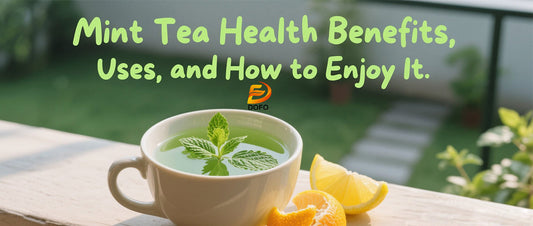
Caffeine in Tea-The Complete Guide for Tea Lovers
HHShare
Author:Nationally certified senior tea appraiser Xu Jiahua
Tea naturally contains caffeine, but the levels and effects are different from coffee. Let's look at what it is, how it works, and the caffeine content of different teas.
Understanding Caffeine: What It Is and How It Works
What is Caffeine?-A Drug That Stimulates Your Brain
Caffeine is a natural stimulant that affects your central nervous system. It blocks adenosine, the chemical that makes you feel tired, so your brain stays more alert and focused. That’s why after drinking tea, you feel more awake, energized, and ready to concentrate.
Caffeine in Action: How It Works in Your Body
Tea naturally contains L-theanine, an amino acid that helps caffeine take effect more smoothly and gently.
After drinking tea, caffeine enters the bloodstream within about 30 minutes, blocking signals that cause drowsiness, increasing alertness, and even slightly improving mood and concentration.The effects are also long-lasting, typically lasting 4-6 hours, without the jitters often associated with coffee.
Is Caffeine Bad for You? Caffeine Benifit and Risk
Caffeine isn’t bad in itself--moderate intake has benefits, but too much or personal sensitivity can cause problems. The key is balance.
Potential Benefits of Moderate Caffeine Intake
Moderate caffeine consumption (e.g., 1-3 cups of tea per day) is safe for most healthy adults and offers several benefits:
-
Improved focus and alertness: Caffeine blocks sleep-inducing adenosine receptors in the brain, keeping you awake and making it easier to focus.
-
Improved mood: Moderate caffeine can stimulate the release of dopamine and serotonin, helping to relieve fatigue and induce a mild sense of euphoria.
-
Enhanced athletic performance: According to the NIH Office of Dietary Supplements, consuming about 2-6 mg of caffeine per kilogram of body weight before exercise has been shown to improve endurance, strength, and power.
- Disease protection: According to the Harvard T.H. Chan School of Public Health, moderate caffeine and coffee consumption have been linked to a reduced risk of stroke, Parkinson's disease, and certain dementias.
Risks of Too Much Caffeine
Excessive caffeine consumption can pose the following risks:
-
Sleep Disturbance: Caffeine can affect sleep duration and quality, especially when consumed late at night.
-
Anxiety and Cardiovascular Disorders: Excessive caffeine consumption can cause increased heart rate, blood pressure, and even palpitations.
- Digestive Discomfort: Caffeine stimulates stomach acid production, which can cause stomach discomfort or heartburn.
How Much Caffeine is Dangerous?

According to the U.S. Food and Drug Administration (FDA),healthy adults should not consume more than 400 mg of caffeine per day, which is equivalent to 4-5 cups of tea or coffee.
The FDA also points out that consuming about 1,200 mg of caffeine in a short period of time may cause symptoms of toxicity, including arrhythmia and seizures.
Can Anyone Consume Caffeine? 3 Types of People to Be Careful
Caffeine boosts energy for many, but some groups need to be extra cautious.
Children and Teens
Children and adolescents are more sensitive to caffeine. Excessive caffeine intake may lead to sleep deprivation, decreased concentration, increased heart rate, and even adversely affect bone development.
Adolescents (ages 12-18) should limit intake to 100 mg per day; children should avoid caffeinated beverages as much as possible.
Pregnant and Breastfeeding Individuals
Pregnant and breastfeeding women metabolize caffeine more slowly. Excessive caffeine intake may increase the risk of miscarriage and low birth weight.The European Food Safety Authority recommends limiting intake to less than 200 mg per day.
Individuals with Certain Medical Conditions
Certain individuals should exercise caution with caffeine consumption, including:
- Those with heart disease or irregular heartbeat: Caffeine may increase heart rate and blood pressure.
- Those with anxiety or sleep disorders: Caffeine may worsen symptoms.
- Those with acid reflux or stomach ulcers: Caffeine can stimulate stomach acid secretion, causing discomfort.
These individuals should consult a doctor before consuming caffeine and limit or avoid caffeinated beverages as appropriate.
5 Factors Affecting Caffeine Content
Here are five factors that determine the amount of caffeine in your cup.
Type of tea
Different teas naturally vary in caffeine. For example, black tea usually has more caffeine than green or white tea, making it more stimulating.
Processing
How tea is processed after harvest—oxidation, roasting, or fermentation—affects caffeine levels.
Generally, more oxidation can mean higher caffeine, while lighter processing keeps it lower.
Growing conditions
Soil, climate, altitude, and shade all influence caffeine. Teas grown in shade (like matcha) often develop more caffeine due to increased chlorophyll and amino acids.
Harvest time
Young buds and early spring leaves contain more caffeine than older, mature leaves. That’s why first flush teas are usually stronger and more prized.
Brewing method
The hotter and longer you brew, the more caffeine is extracted. Finer tea leaves also release caffeine faster, resulting in a bolder cup.
Which Tea Has The Most Caffeine?
Each type of tea has a different caffeine level—Let's first understand.
Oolong Tea Caffeine
Oolong tea generally falls in the mid-range of caffeine, between green and black tea. Depending on the oxidation and brewing method, a cup usually contains 30–50 mg .
The caffeine content of different oolong teas varies,you can learn more in our full guide: “The Ultimate Oolong Tea Caffeine Guide”
Black Tea Caffeine
Black tea usually has the highest caffeine content among teas, averaging 40-70 mg per cup.Stronger teas or broken leaf black teas release more caffeine, making black tea a popular choice in the morning.
Different black teas contain different caffeine levels. Learn more about “Black Tea Caffeine” to find the cup of black tea that's right for you.
Green Tea Caffeine
Green tea usually contains a small amount of caffeine, averaging about 20-45 mg per cup. This makes it lighter than black tea, yet still enough to boost focus and alertness.
For a deeper look, check out our guide “Does green tea have caffeine” with detailed insights and practical tips.
White Tea Caffeine
White tea is often considered low in caffeine, but this isn't always the case. Young buds and first-picked leaves may contain 15–30 mg of caffeine per cup, sometimes approaching the level of green tea.
Pu-erh Tea Caffeine
Pu-erh varies widely depending on whether it’s raw (sheng) or ripe (shou). On average, it ranges 30-60 mg per cup, and aging or fermentation may slightly alter caffeine levels.
Pu-erh’s caffeine is released gradually, making it ideal for those who want alertness without jitters.
How Much Caffeine in Tea vs Coffee ?
Here’s a quick caffeine chart to help you see the differences at a glance.
|
Tea type |
Average Caffeine (per 8 oz cup) |
|
Oolong tea |
30–50 mg |
|
Black tea |
40-70 mg |
|
Green tea |
20-45 mg |
|
White tea |
15-30 mg |
|
Pu-erh tea |
30-60 mg |
|
Coffee |
95-120 mg |

Making Smart Choices: How to Enjoy Tea Mindfully
Here are a few mindful tips to make the most of your tea.
Monitor Your Intake
Tea is wonderful, but too much of a good thing can backfire. Most people feel great with 3-5 cups a day--if you start feeling restless or have trouble sleeping, it’s a gentle reminder to slow down.
Choose Tea Type Wisely
Each tea has its own personality. Green tea is fresh and full of antioxidants, black tea gives you that morning kick, and herbal blends are perfect for winding down at night. If you’re pregnant or extra sensitive, calming options like rooibos or chamomile are safe bets.
Brewing Hacks
Brewing time affects the taste and caffeine content of your tea. Shorter brewing times result in a lighter tea, while longer brewing times increase its strength.
Finding Your Perfect Brew? Explore DOFO's Diverse Tea Collection

From planting to brewing, every detail of DOFO Tea is designed to bring you an authentic tea experience worth savoring.
Naturally Grown and Hand-picked
Our teas are grown in pristine tea mountains, free from pollution and nurtured by fresh air, clean water, and rich soil. Each leaf is hand-picked at its optimal time to lock in freshness, aroma, and nutrients.
This traditional approach preserves the authentic taste of Chinese tea while respecting nature’s balance.
Strictly Controlled Tea Quality
From the tea garden to your teacup, we maintain strict quality standards. Every batch is carefully inspected for leaf shape, color, fragrance, and safety. Advanced testing ensures no harmful residues, while traditional expertise guarantees that only premium-grade leaves are selected.
Products are Certified by FDA and Dun & Bradstreet
DOFO teas are recognized internationally, with FDA certification for product safety and Dun & Bradstreet verification for business credibility.These certifications reflect our dedication to responsible sourcing and reliable global trade, giving you peace of mind with every purchase.
A Variety of Tea Types are Available for Selection
Our collection covers the full spectrum of Chinese teas--delicate green teas, robust black teas, aromatic oolongs, mellow pu-erh, and fragrant flower teas.
We also offer limited seasonal harvests and rare specialty teas, giving tea lovers the chance to explore unique flavors from different terroirs.
Product Caffeine Content is Clearly Marked
Every tea listing includes clear caffeine content details, helping you choose the right tea for the right moment-whether you need a morning energy boost, an afternoon pick-me-up, or a calming cup before bed.Helps you monitor your caffeine intake.
Recommended by Multiple Media Outlets
DOFO teas have been featured in respected lifestyle, wellness, and gourmet media outlets— including Yahoo! Finance, AP News, MarketWatch, KTLA 5, Seeking Alpha, Benzinga, PR Newswire and more.
They are praised for authentic quality, innovative presentation, and cultural value, earning growing recognition among tea enthusiasts across Asia, Europe, and North America.
Customer-Centered Experience
We provide secure packaging to preserve tea freshness, global shipping for accessibility, and friendly customer support to assist you in selecting the perfect tea. Our mission is not only to deliver tea but also to share the heritage of Chinese tea culture with the world.
Refresh your body and mind--choose DOFO teas now and power your life with every cup.
Frequently Asked Questions
How Much Caffeine in Decaf Tea?
Decaf tea isn’t 100% caffeine-free--it usually contains about 2-5 mg per cup, much less than regular tea but still trace amounts.
Is it OK to Drink Tea Every Day?
Yes! Drinking tea daily can support hydration, provide antioxidants, and improve focus. Just watch your caffeine intake if you’re sensitive.
Which Tea is The Healthiest?
Green tea is generally considered the healthiest, thanks to its high antioxidants, heart-supporting compounds, and metabolism-boosting benefits. Regular consumption may also help lower the risk of certain chronic diseases and support overall wellness.Perfect for everyday tea.
How Much Caffeine in Tea Bag?
On average, one tea bag contains 30-50 mg of caffeine, depending on the type and steeping time. Stronger teas like black or matcha can be higher.
Let’s Discover Your Signature Tea at DOFO
From the smooth elegance of green tea to the bold richness of black, the balanced charm of oolong, or the depth of aged pu-erh, DOFO has a brew that fits every mood and moment.
Come and relax with a cup of DOFO Tea now.









